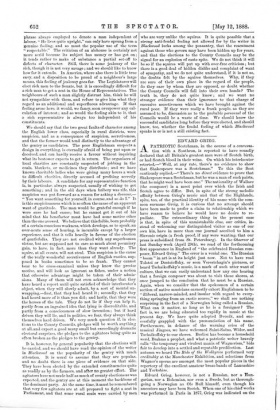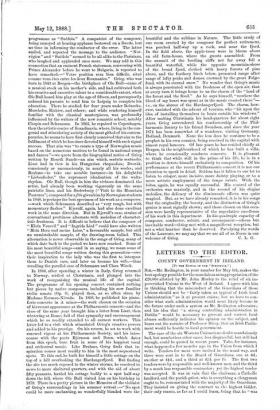EDVARD GRIE G.
itPATRIOTIC Scotchman, in the course of a conversa- tion with a Southron, is reported to have roundly declared that all Britain's greatest men were of Scotch birth, or had Scotch blood in their veins. On which his interlocutor retorted,—" Well, at any rate, there's no evidence to show that Shakespeare was a Scotchman." To this the Scot cautiously replied,—" There's no direct evidence to prove that Shakespeare was a Scotchman, but he was a man of such pairts, that he might weel have been one." The nationality of Wallace (the composer) is a moot point over which the Irish and Scotch agree to differ. But, in spite of the strong melodic affinity between Grieg's music and that of the Highlands, spite, too, of the practical identity of his name with the com- mon surname Greig, it is curious that no attempt should have been made to prefer a claim to relationship which we have reason to believe he would have no desire to re- pudiate. The extraordinary thing in the present case is that, in spite of this unmistakable clue, our critics, in- stead of welcoming our distinguished visitor as one of our own kin, have in more than one journal ascribed to him a Slavonic origin (a fresh proof, if any were wanting, that our press is subsidised from St. Petersburg). In the Observer of last Sunday week (April 29th), we read of the forthcoming first appearance in England of "the celebrated Russian com- poser, Edvard Grieg." The error is a venial one. The Russian " boom " in art is at its height just now. Not to have read Tolstoi or Dostoieffsky, or seen Verestchagin's pictures, or heard Tschaikoffsky's music, is a mark of such utter want of culture, that we can easily understand how any one hearing that a foreign composer was about to visit these shores, at once jumped to the conclusion that he must be a Russian. Again, when we consider that the spokesmen of a certain section of native musicians earnestly exhort Englishmen to be "illiberal, narrow-minded, and insular with regard to every- thing springing from an exotic source," we shall see nothing surprising in the fact of a Norwegian being called a Russian. What can it matter, so long as he is a foreigner ? The fact is, we are being educated too rapidly in music at the present day. We have quite adopted Dvorak, and suc- cessfully grappled with the paonunciation of his name. Furthermore, in defiance of the warning cries of the musical Jingoes, we have welcomed Saint-Saens, Widor, and Tschaikoff sky to our shores. Berlioz has become a household word, Brahms a prophet, and what a patriotic writer bravely calls "the temporary and virulent mania of Wagnerism," bids fair to develop into a settled and reputable predilection. Last autumn we heard The Bide of the Walkyries performed very creditably at the Manchester Exhibition, and selections from Wagner's operas are amongst the most popular pieces in the repertory of the excellent amateur brass-bands of Lancashire and Yorkshire.
Edvard Grieg, however, is not a Russian, nor a Run- garian, nor a Bohemian, nor even a Swede, but as thorough- going a Norwegian as Ole Bull himself, even though his ancestors may have been Scotch. When one of his chief works was performed in Paris in 1877, Grieg was indicated on the programme as " Suedois." A compatriot of the composer, being annoyed at hearing applause bestowed on a Swede, lost no time in informing the conductor of the error. The latter smiled, and repeated the message to the audience. " Nor- vegien " and " Suedois " seemed to be all alike to the Parisians, who laughed and applauded once more. We may add in this connection that an eminent French statesman, conversing with Prince Alexander before he went to Bulgaria, is reported to have remarked,—" Votre position sera bien difficile, situe comme vous etes entre lea deux Roumanies." Grieg, who was born in 1843 at Bergen—the birthplace of Ole Bull—came of a musical stock on his mother's side, and had cultivated both his creative and executive talent to a considerable extent, when Ole Bull heard him play at the age of fifteen, and peremptorily ordered his parents to send him to Leipzig to complete his education. There he studied for four years under Reinecke, Moscheles, Richter, and others ; and while rendering himself familiar with the classical masterpieces, was profoundly influenced by the writers of the new romantic school, notably Chopin and Schumann. In 1862, he repaired to Copenhagen, then the artistic centre of Scandinavia, where, living in the con- genial and stimulating society of the most gifted of his contem- poraries, he seems to have first clearly conceived that aim to the fulfilment of which he has since devoted himself with such signal success. That aim was "to create a type of Norwegian music based on the numerous motives to be found in national songs and dances "—we quote from the biographical notice of Grieg written by Henrik Sundt—an aim which, mutatis mutandis, Liszt had in view in his Hungarian rhapsodies; Dvoralk, consciously or -unconsciously, in nearly all his works ; and Brahms—to take one notable instance—in his delightful " Liebeslieder," the supremest idealisation of the waltz- rhythm. Ole Bull, though in him the virtuoso dominated the artist, had already been working vigorously on the same patriotic lines, and his Saeterbesog (" V isit to the Mountain Pastures"), composed for afete givenhim by Norwegian students in 1848, is perhaps the best specimen of his work as a composer, —work which Schumann described as "very rough, but with momentary flashes." Kjeralf, again, had also done excellent work in the same direction. But in Kjerulf's case, strains of conventional prettiness alternate with melodies of character- istic freshness. It is difficult to believe that the composer of ." Klein Venevil " and " Ingrids Lied" could have also written "Mein Herz und meine Leier," a favourable sample, but still an unmistakable sample, of the drawing-room ballad. This alternation is never observable in the songs of Grieg. many of which date back to the period we have now reached. Some of his most beautiful songs—and in so saying, we mean some of the most beautiful songs written during this generation—owe their inspiration to the lady who was the first to interpret them to Danish ears, and later on became his wife,—thus recalling the parallel case of Schumann and Clara Wieck.
In 1866, after spending a winter in Italy, Grieg returned to Norway, settled at Christiania, and plunged into the work of reorganising the musical life of the capital. The programme of his opening concert contained nothing but pieces by native composers, including his now familiar violin sonata (Op. 8), played then, as so often since, by Madame Norman-Nerada. In 1868, he published his piano- forte concerto in A minor—the work chosen on the occasion of his recent appearance at the Philharmonic concert—and the close of the same year brought him a letter from Liszt, then wintering at Rome, full of that sympathy and encouragement which he so readily extended to all earnest workers. This letter led to a visit which stimulated Grieg's creative powers and added to his prestige. On his return, he set to work with renewed vigour at his Philharmonic Society, and his inter- course with the poets Bjornson and Ibsen, which dates from this epoch, bore fruit in some of his happiest vocal and orchestral music. Like Brahms, Grieg finds that in- spiration comes most readily to him in the most sequestered spots. To this end, he built for himself a little cottage on the top of a hill overlooking the Hardangerfjord. But finding the site too much exposed to the winter storms, he resolved to move to more sheltered quarters, and with the aid of about fifty peasants, hauled his cottage bodily to a spot half-way down the hill, where Ole Bull visited him on his birthday in 1879. There is a pretty picture in the Memoirs.of the violinist of Grieg's surroundings in his summer retreat :—" No spot could be more enchanting, so wonderfully blended were the beautiful and the sublime in Nature. The little study of one room erected by the composer for perfect retirement, was perched half-way up a rock, and near the fjord. In the field above, the apple-trees were in bloom about an old farm-house, where the guests assembled. From the summit of the beetling cliffs not far away fell a beautiful waterfall, while the opposite mountain-shore of the broad fjord, clothed with heavy forests of pine above, and the feathery birch below, presented range after range of lofty peaks and domes, crowned by the great Folge- fond, with its eternal snow." No wonder that Grieg's music is always penetrated with the freshness of the open air, that at every turn it brings home to us the charm of the "land of the forest and the flood." As he says himself, "nowhere the blood of my heart was spent as in the music created there "- i.e., on the shores of the Hardangerfjord. The charm, how- ever, vanished with the advent of tourists, who "hit upon the idea of installing themselves in boats outside his windows." After making Christiania his head-quarters for about eight years, Grieg surrendered his conductorship of the Phil- harmonic Society to his friend Svendsen, and. since the year 1874 has been somewhat of a wanderer, visiting Germany, Holland, Denmark. None the less does he continue to be a prophet in his own country, being received in the capital with almost royal honours. Of late years he has resided chiefly at Bergen, in the neighbourhood of which he has built a villa, where he occasionally conducts concerts. It is pleasant to think that while still in the prime of his life, he is in a position to devote himself exclusively to composition. Of his performance at the recent Philharmonic concert it is not our intention to speak in detail. Seldom has it fallen to our lot to listen to crisper, more incisive, more dainty playing, or to a more artistic employment of the tempo rubato. With the baton, again, he was equally successful. His control of the orchestra was masterly, and in the second of his elegiac melodies, the delicacy of the diminuendo effects was quite magical. But, as we have already remarked, it is in his songs that the originality, the beauty, and the distinction of Grieg's genius is most signally shown ; and those chosen on this occa- sion were hardly representative of the superlative excellence of his work in this department. In his quadruple capacity of composer, conductor, soloist, and accompanist—odious but inevitable word—Grieg met with a magnificent reception, but not a whit heartier than he deserved. Parodying the words of the Laureate, we may say that we are all of us Norse in our



































 Previous page
Previous page